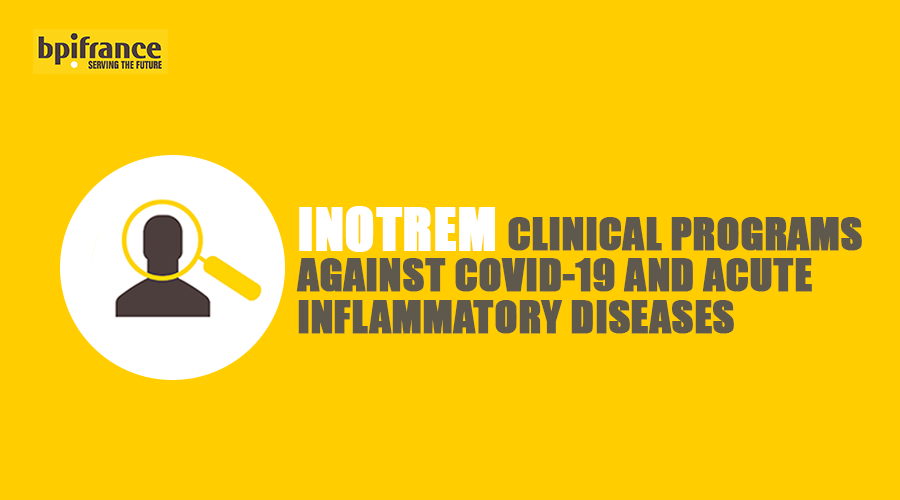Inotrem, The French Biotech Firm Fighting Sepsis, COVID-19 And Other Acute and Chronic Inflammatory Diseases
Founded in 2013, Inotrem is working on groundbreaking immunotherapies against life-threatening inflammatory syndromes. Backed by European and North American investors, as well as the French government, the biotech company is conducting a key phase of clinical trials on its lead drug candidate ‘nangibotide’ and working on other compounds that could save millions of lives. Sepsis…

Founded in 2013, Inotrem is working on groundbreaking immunotherapies against life-threatening inflammatory syndromes. Backed by European and North American investors, as well as the French government, the biotech company is conducting a key phase of clinical trials on its lead drug candidate ‘nangibotide’ and working on other compounds that could save millions of lives.
Sepsis is currently the 10th leading cause of death in developed countries. This extreme response of the immune system to an infection, whether viral or bacterial, is responsible for nearly 11 million fatalities worldwide each year. Sepsis can lead to septic shock (a dangerous drop in blood pressure), multiple organ failure and long-term disabilities. Today, some medical solutions exist to fight it, but they only tackle specific aspects and symptoms and not the mechanism of the disproportionate immune reaction itself.
The discovery in 2000 of the biological pathway TREM-1, an amplifier of the immune response cycle, brought hope for the development of such a mechanism-based treatment in septic shock cases. Research in the field by a group of scientists and doctors from the ICU of Nancy University Hospital, in eastern France, led to the creation of biotech company Inotrem in 2013.
Taming TREM-1
Founded by Jean-Jacques Garaud, former head of research and early development at the Roche Group, Prof. Sebastien Gibot, professor of Critical Care Medicine at the University of Lorraine Medical School in Nancy, and Dr. Marc Derive, Inotrem is relying on a novel approach of immunotherapy which targets the TREM-1 pathway. The company is headed by industry veteran Sven Zimmermann. Since then, it has completed two rounds of financing and received funding from European and American investors, such as Andera, Sofinnova Partners, Morningside Venture, Invus, Biomed Invest and Fountain Healthcare Partners.
The biotech company is now at an advanced stage in the Phase II clinical trials of its lead drug candidate, nangibotide, the first-in-class TREM-1 inhibitor. To optimize this therapeutic solution, Inotrem is developing a companion diagnostic test: an injection test using soluble TREM-1 as a biomarker to identify septic shock patients who are more likely to benefit from the treatment.
The results of the clinical trials for both technologies are expected by mid-2022. If conclusive, they will unlock the next phase: the development and distribution of the treatment, as well as the commercialization of the test, co-developed with Roche Diagnostics.
One pathway, multiple indications
Inotrem has also discovered that TREM-1 responds to a much broader spectrum of triggers than just septic shock, and thus, that nangibotide could have an even greater potential to save lives. Recently, the biotech research team highlighted the implication of the biological pathway in severe forms of COVID-19 causing respiratory distress.
Following encouraging early clinical work, the biotech is now conducting a Phase II/III study to demonstrate the efficacy and safety of nangibotide in treating critically ill coronavirus patients. The project received a €52.5 million euro public funding by Bpifrance, on behalf of the French government as part of its Investments for the Future programme and the France Recovery Plan. This new financial support will allow 730 ICU patients to be enrolled — initially in France and Belgium, and potentially in other European countries.
The many proven and potential indications with inflammatory syndromes involving TREM-1 also led Inotrem to develop a proprietary technology platform. In parallel to the nangibotide solution, the French company is working on developing treatments in a large number of inflammatory indications, both acute and chronic. This includes a new anti-TREM-1 monoclonal antibody targeting chronic inflammatory diseases for which the Nancy-based biotech has filed a patent in June 2021. The clinical program is expected to start in late 2023.
A new era for the biotech industry?
Recent research on DNA — with breakthroughs like CRISPR — and renewed interest in mRNA advances linked to the fight against COVID-19, have raised the profile of biotech firms. “One can think there will be a post-pandemic era for biotech, especially in Europe where it has stayed below the radar despite the existence of thousands of biotech companies,” says Jean-Jacques Garaud, now Inotrem’s Executive Vice-President, Head of Scientific and Medical Affairs. “Two-thirds of medical innovations actually come from biotechs and not from Big Pharma, which has the means to develop and produce them.”
Every year, a growing number of biotech startups are founded, but it is much more of a long-distance race than a sprint. “Along with the cinema industry, biotechnology may be the sector carrying the most risks. It requires major investments and there is no turnover for years,” says Garaud.“Sometimes it takes a decade of experiments and clinical trials for a product to be fully developed. And sometimes, it also doesn’t lead to any results.”
In the French biotech company’s case, the last step is close, with a team now of 26. In 2020, Inotrem was chosen to join the French Tech 120, the program launched by the French government dedicated to support the development of fast growing startups. For Jean-Jacques Garaud, there is only one key to success: “Quality,” he says without hesitation. “The quality of the biology, the quality of the methodology and the quality of the people leading the study. This is what guarantees results.”
Related
Trending

